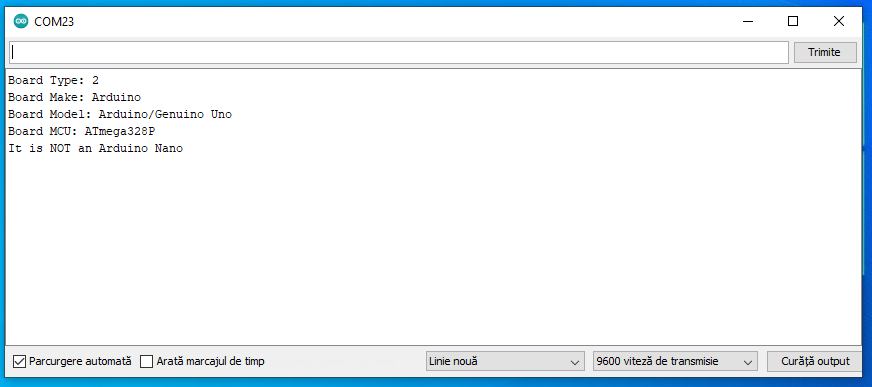Pentru a putea determina tipul unei placi de dezvoltare putem folosi o librarie special creata in acest scop.
Aceasta librarie se numeste Board Identify si se poate descarca de aici. Dupa descarcarea acestei librarii putem proceda la instalarea ei accesand meniul Schita > Incarcare biblioteca > Adaugare librarie.zip.
Dupa ce s-a instalat biblioteca putem deschide sketchul cu care vine ea ca exemplu accesand meniul Fisier > Exemple > Board Identify > Board Identify.
Sketchul este cel de mai jos:
/*
* Board_Identify.cpp
* Identify the microcontroller that the code has been compiled for.
* Created by Matt Fryer on 2017-10-04.
* Licensed under LGPL (free to modify and use as you wish)
*/
// Adding this line before the library is included will cause a warning in the compile output window containing the identified board
#define BOARD_IDENTIFY_WARNING
// If warnings still don't display, ensure "File->Preferences->compiler warnings" is set to "Default".
// Even doing this, some boards still won't display the warning in the compile window but the constants will still be created.
// Include the library
#include <Board_Identify.h>
void setup() {
// Open the serial
Serial.begin(9600);
// Print the board information to the serial using the defined terms
Serial.print(F("Board Type: "));
Serial.println(BoardIdentify::type);
Serial.print(F("Board Make: "));
Serial.println(BoardIdentify::make);
Serial.print(F("Board Model: "));
Serial.println(BoardIdentify::model);
Serial.print(F("Board MCU: "));
Serial.println(BoardIdentify::mcu);
// Board Indentify uses the namespace BoardIdentify to prevent variable name conflicts
// BoardIdentofy::type is a unique integer that will never be changed and so should maintain future compatibility.
// It is advised to use this for any logic such as:
if (BoardIdentify::type == 4) {
Serial.print(F("It is an Arduino Nano"));
} else {
Serial.print(F("It is NOT an Arduino Nano"));
}
}
void loop() {
}Dupa ce vom incarca sketchul in placa de dezvoltare si-l vom rula in Terminalul serial vom primi ca rezultat un exemplu precum cel de mai jos (sketchul fiind testat pe Arduino Uno):
